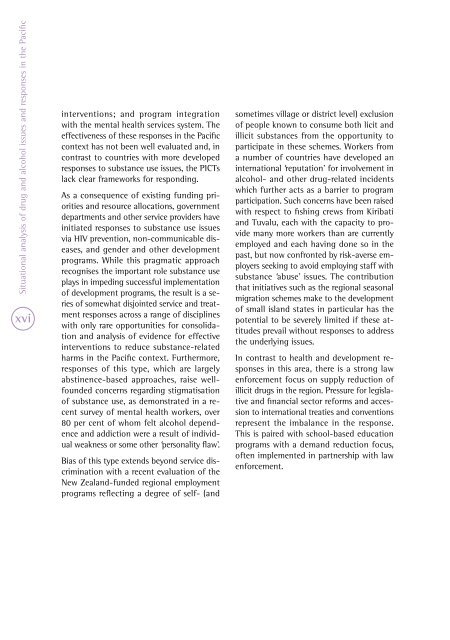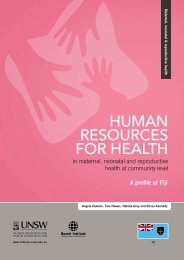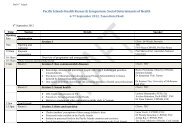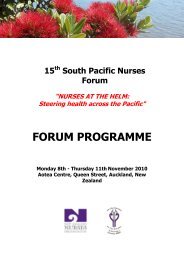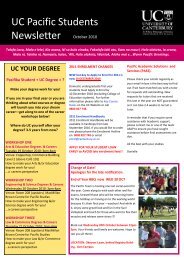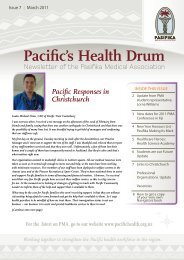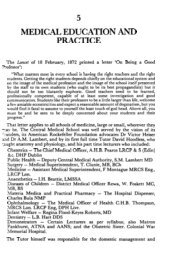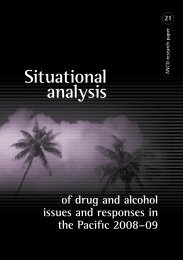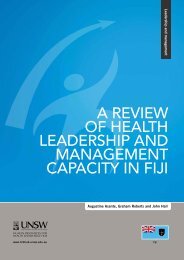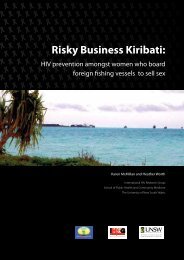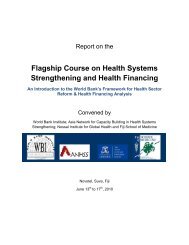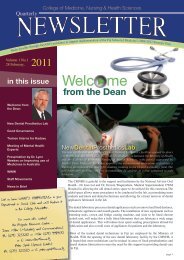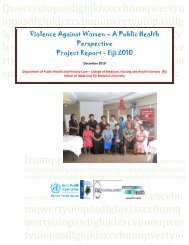rp21 situational analysis - Pacific Health Voices
rp21 situational analysis - Pacific Health Voices
rp21 situational analysis - Pacific Health Voices
Create successful ePaper yourself
Turn your PDF publications into a flip-book with our unique Google optimized e-Paper software.
Situational <strong>analysis</strong> of drug and alcohol issues and responses in the <strong>Pacific</strong><br />
xvi<br />
interventions; and program integration<br />
with the mental health services system. The<br />
effectiveness of these responses in the <strong>Pacific</strong><br />
context has not been well evaluated and, in<br />
contrast to countries with more developed<br />
responses to substance use issues, the PICTs<br />
lack clear frameworks for responding.<br />
As a consequence of existing funding priorities<br />
and resource allocations, government<br />
departments and other service providers have<br />
initiated responses to substance use issues<br />
via HIV prevention, non-communicable diseases,<br />
and gender and other development<br />
programs. While this pragmatic approach<br />
recognises the important role substance use<br />
plays in impeding successful implementation<br />
of development programs, the result is a series<br />
of somewhat disjointed service and treatment<br />
responses across a range of disciplines<br />
with only rare opportunities for consolidation<br />
and <strong>analysis</strong> of evidence for effective<br />
interventions to reduce substance- related<br />
harms in the <strong>Pacific</strong> context. Furthermore,<br />
responses of this type, which are largely<br />
abstinence-based approaches, raise wellfounded<br />
concerns regarding stigmatisation<br />
of substance use, as demonstrated in a recent<br />
survey of mental health workers, over<br />
80 per cent of whom felt alcohol dependence<br />
and addiction were a result of individual<br />
weakness or some other ‘personality flaw’.<br />
Bias of this type extends beyond service discrimination<br />
with a recent evaluation of the<br />
New Zealand-funded regional employment<br />
programs reflecting a degree of self- (and<br />
sometimes village or district level) exclusion<br />
of people known to consume both licit and<br />
illicit substances from the opportunity to<br />
participate in these schemes. Workers from<br />
a number of countries have developed an<br />
international ‘reputation’ for involvement in<br />
alcohol- and other drug-related incidents<br />
which further acts as a barrier to program<br />
participation. Such concerns have been raised<br />
with respect to fishing crews from Kiribati<br />
and Tuvalu, each with the capacity to provide<br />
many more workers than are currently<br />
employed and each having done so in the<br />
past, but now confronted by risk-averse employers<br />
seeking to avoid employing staff with<br />
substance ‘abuse’ issues. The contribution<br />
that initiatives such as the regional seasonal<br />
migration schemes make to the development<br />
of small island states in particular has the<br />
potential to be severely limited if these attitudes<br />
prevail without responses to address<br />
the underlying issues.<br />
In contrast to health and development responses<br />
in this area, there is a strong law<br />
enforcement focus on supply reduction of<br />
illicit drugs in the region. Pressure for legislative<br />
and financial sector reforms and accession<br />
to international treaties and conventions<br />
represent the imbalance in the response.<br />
This is paired with school-based education<br />
programs with a demand reduction focus,<br />
often implemented in partnership with law<br />
enforcement.


